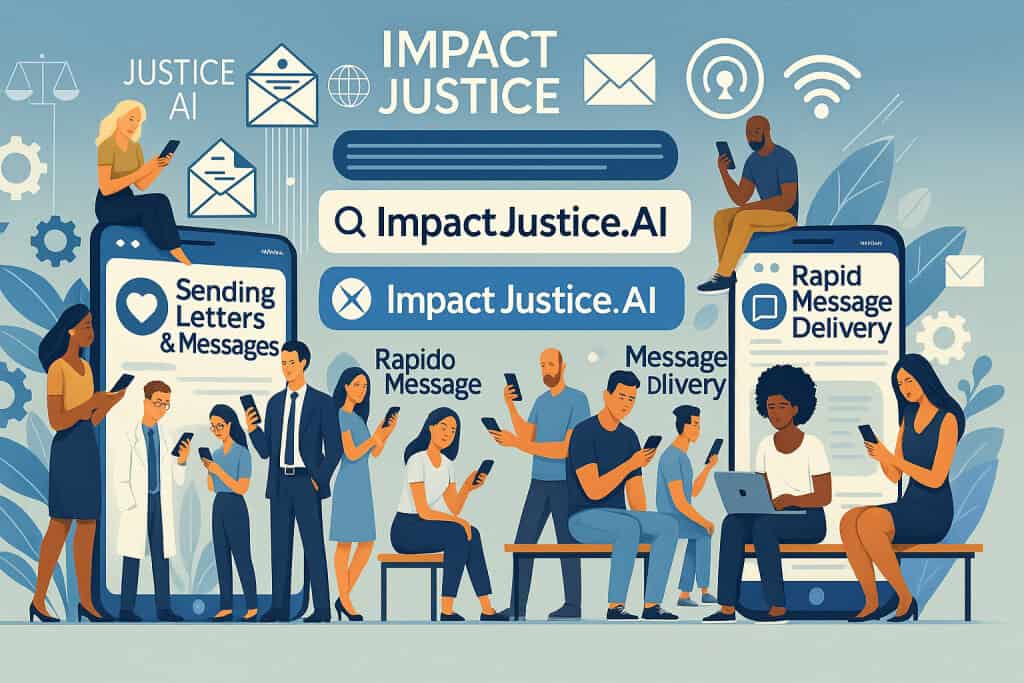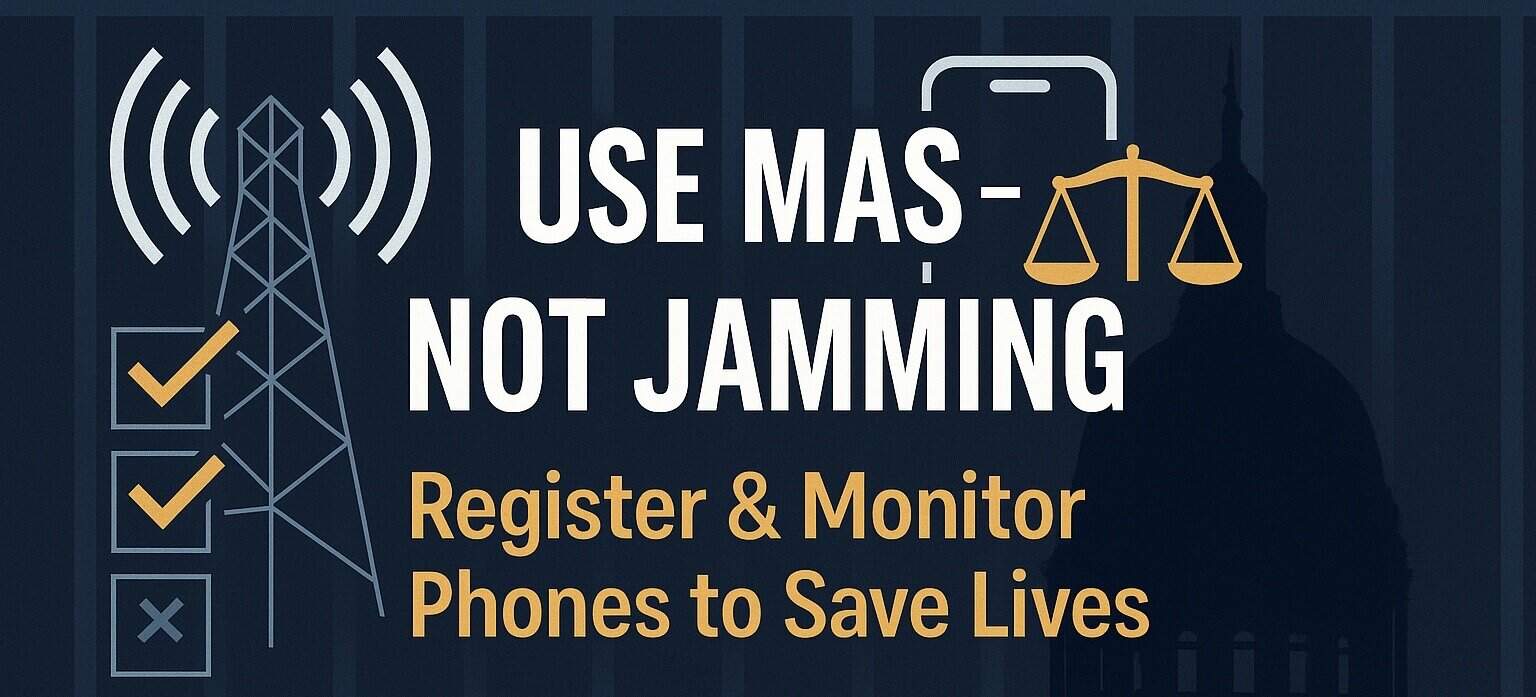773 people have died in Georgia prisons over the past three years. In 2025 alone, 178 people are already dead—nearly one death every day1. Last year brought 330 deaths2, a 25% spike from 2023’s 265 deaths3. This accelerating carnage unfolds as 20,000 cell phones operate illegally inside Georgia’s prisons, fueling the gang violence, staff corruption, and criminal enterprises that the Department of Justice found are killing people behind bars. 4
Georgia has already spent millions installing Managed Access Systems (MAS) that can control, monitor, and record every phone in every prison. The technology works. The infrastructure exists. Advanced AI monitoring could even flag criminal activity automatically. Yet instead of using these systems to bring communication above ground where it can be supervised, the state continues a failed prohibition that drives phones underground—directly fueling the constitutional crisis that has now killed more than one person every single day.
The choice is stark: supervise phones with MAS and AI, or watch the death toll climb toward 400 in 2025.
SIDEBAR: What is MAS?
Managed Access Systems (MAS) are carrier-approved networks that create a controlled cellular environment around prisons. Unlike jamming systems that block all signals indiscriminately, MAS works with wireless carriers to selectively allow or deny specific devices.
How it works:
- Intercepts all cellular traffic within prison boundaries
- Identifies each device by unique identifiers (IMEI numbers)
- Cross-references devices against approved “white lists”
- Allows registered phones to connect normally
- Blocks unregistered devices from receiving service
- Generates detailed logs for investigation
Key advantages over jamming:
- Legal: FCC-approved for prison use since 2010
- Precise: Targets specific devices, not entire areas
- Safe: No interference with emergency services or nearby communities
- Flexible: Can instantly add or remove devices from approved lists
- Intelligence-gathering: Provides call records and pattern data
Current status in Georgia:
MAS infrastructure is already installed across GDC facilities at significant taxpayer expense. The technology is operational and capable of controlling all 20,000+ phones currently in the system – it simply needs policy authorization to register and monitor devices rather than attempting to block them all.
The Black Market is Killing People
The DOJ’s devastating October 2024 report revealed how contraband phones enable the criminal enterprises destroying Georgia’s prisons. Gang leaders use these devices to order violence across facilities, coordinate with criminal networks outside, and threaten families for extortion money. 5 Between 2018 and 2023, homicides nearly doubled from 48 to 94. The violence has only accelerated since—with deaths jumping from 265 in 2023 to 330 in 2024, now racing toward another record year.
The DOJ documented direct links between contraband phones and deadly violence:
- A person incarcerated at Smith State Prison used a contraband phone to direct a 2021 drive-by shooting in Marietta
- Gang members at multiple facilities coordinated mass attacks via phone, resulting in dozens of hospitalizations
- Hundreds of GDC officers have been arrested for contraband smuggling, with phones as a primary corruption driver
The current approach isn’t just failing—it’s enabling mass death. Every phone pushed into the black market becomes a tool for violence, corruption, and criminal conspiracy. The 773 deaths over three years represent the human cost of prohibition policies that criminalize communication while empowering criminal networks.
MAS Plus AI: The Solution Georgia Already Owns

Managed Access Systems represent the Federal Communications Commission’s endorsed solution to contraband phones. Unlike jamming—which the FCC prohibited for decades due to interference risks—MAS works with wireless carriers to selectively allow or deny specific devices within prison boundaries. 6
Georgia has already invested in this technology across its prison system. MAS can:
- Identify every phone within prison walls in real-time
- Allow or block specific devices based on registration status
- Record all calls (except privileged attorney communications)
- Generate detailed metadata for investigation and pattern analysis
- Prevent outside interference unlike jamming systems
But the technology’s potential extends far beyond basic call recording. Advanced AI monitoring systems could analyze communication patterns to automatically flag:
- Threats and extortion attempts through natural language processing
- Gang coordination patterns across multiple facilities and outside contacts
- Financial crimes including fraud schemes and money laundering
- Drug trafficking networks and contraband smuggling operations
- Violence planning through behavioral pattern recognition
- Staff corruption indicators based on unusual communication patterns
These AI systems could work 24/7, processing thousands of calls simultaneously, flagging genuine threats for human review while leaving ordinary family conversations untouched. The technology exists today—major tech companies already deploy similar systems for content moderation at massive scale.
A Policy Framework That Saves Lives
Registration with Amnesty: Establish a 30-day window allowing people to register existing phones without disciplinary consequences. This immediately removes thousands of devices from black market control and places them under MAS supervision, breaking the cycle of violence that has killed 773 people in three years.
Affordable Legal Access: Permit purchase of approved, low-cost smartphones through commissary vendors. When legal options exist, illegal markets shrink. This basic economic principle applies to contraband phones just as it does to any other commodity.
AI-Enhanced Monitoring: Deploy machine learning systems to analyze communication patterns and automatically flag criminal activity. Unlike human monitors who can only review a tiny fraction of calls, AI can process every conversation in real-time, identifying genuine threats while protecting privacy in routine family contact.
Constitutional Safeguards:
- Attorney calls remain privileged and completely unmonitored
- AI systems trained to recognize and protect legal communications
- Victims can block unwanted contact through a state database
- Due process protections for account suspensions based on AI flags
- Public reporting on system accuracy and false positive rates
Graduated Response System: Use AI scoring to trigger appropriate responses—from automated warnings for policy violations to immediate human review for serious threats. This allows precise intervention without mass punishment.
Cost Recovery and Revenue: Fund MAS and AI operations through reasonable calling rates, potentially generating net revenue for the state. Transparent pricing eliminates the profit motive driving black market corruption while making the system self-sustaining.
Why This Serves Public Safety
The DOJ found that Georgia’s prisons fail to protect people precisely because gangs control housing units, staff cannot supervise effectively, and criminal networks operate with impunity. 7 The 773 deaths over three years prove this failure is accelerating. Registered phones under AI-enhanced MAS supervision would:
Reduce gang power by eliminating their role as communication intermediaries. When families can call directly through monitored channels, gangs lose leverage over desperate people trying to maintain connections.
Decrease staff corruption by removing the profit motive for smuggling. The DOJ documented that contraband trafficking—with phones as a primary driver—has led to hundreds of officer arrests. 8 AI monitoring could even flag suspicious patterns in staff behavior.
Enable real enforcement by giving investigators actual phone records, call patterns, network data, and AI-generated threat assessments to prosecute genuine criminal activity instead of chasing shadows in an underground market.
Support rehabilitation through family contact, legal access, educational opportunities, and mental health resources—all factors that reduce recidivism and institutional violence.
Prevent violence before it happens through predictive analytics that identify escalating tensions and coordination patterns before they result in attacks.
The Technology Advantage
AI monitoring systems offer unprecedented capabilities for prison safety:
Real-time threat detection: Natural language processing can identify threats, extortion attempts, and violence planning as they happen, not days later during manual review.
Pattern recognition: Machine learning can spot coordination between facilities, identify criminal networks, and track how outside organizations influence prison violence.
Behavioral analysis: AI can establish baseline communication patterns for individuals and flag dramatic changes that might indicate coercion, mental health crises, or criminal recruitment.
Multi-language capability: Advanced systems can monitor calls in dozens of languages, closing gaps that criminals currently exploit.
Continuous learning: AI systems improve over time, learning from false positives and adapting to new criminal tactics.
Scale efficiency: Unlike human monitors limited to reviewing a tiny fraction of communications, AI can analyze every call, text, and data transmission in real-time.
The combination of MAS infrastructure with AI analysis creates a monitoring capability that’s both more effective and more protective of legitimate privacy than current approaches.
The Jamming Distraction
Some Georgia leaders advocate for signal jamming as an additional enforcement tool. This is mostly political theater and fear mongering in an gubernatorial election season9 10. This approach ignores both the available technology and the human cost of current policies.
Jamming risks interference with emergency services and legitimate communications both inside and outside prison boundaries. It silences everyone—families, attorneys, emergency responders—to stop criminals who will simply adapt their methods. Stopping all cell phones, which has proven impossible, won’t stop criminal activity. MAS with AI monitoring can identify specific threats while preserving legitimate communication and generating actionable intelligence about criminal networks.
Why pay twice for an inferior solution when MAS offers superior results, especially when paired with AI?
The Death Toll Demands Action
The statistics are unambiguous: 773 deaths in three years, with 178 already dead in 2025. Each number represents a family destroyed, a community traumatized, and evidence that current policies enable mass death rather than prevent it.
The DOJ gave Georgia 49 days to address constitutional violations or face federal litigation. The October report makes clear that current communication policies contribute directly to the violence, corruption, and chaos killing people in Georgia prisons. Supervised communication isn’t just humane—it’s a life-saving necessity.
The Moment for Change
Twenty thousand phones already exist in Georgia prisons. The question isn’t whether people will communicate with the outside world. The question is whether that communication will be supervised by advanced AI systems working for public safety, or controlled by gangs working for profit and violence.
MAS with AI monitoring gives Georgia the tools to choose supervision over chaos, intelligence over ignorance, and life over death. The technology is installed. The AI capabilities exist. The policy framework is clear. What’s missing is the political will to use proven solutions instead of failed prohibition that has killed 773 people in three years.
Tell your legislators: MAS works. AI monitoring works. Stop the deaths. Legislator lookup: https://www.legis.ga.gov/find-my-legislator
Contact media: Ask why the state chooses mass death over smart technology.
Use ImpactJustice.AI: Send coordinated messages demanding life-saving policy over deadly prohibition. ImpactJustice.AI: https://ImpactJustice.AI

The DOJ found Georgia’s prisons unconstitutional. The death toll proves current policies are lethal. AI-supervised communication through MAS isn’t just better policy—it’s a life-saving measure that Georgia can implement immediately with technology it already owns.
The infrastructure exists. The AI capability is proven. The need is urgent. 773 people are dead. How many more will die before Georgia uses the tools it already has to save lives?

- GDC Mortality Statistics: https://gps.press/gdc-mortality-statistics/#2025-mortality[↩]
- GDC Mortality Statistics 2024: https://gps.press/gdc-mortality-statistics/#2024-mortality[↩]
- Lives Lost Under GDC Custody: https://gps.press/[↩]
- GPS: https://gps.press/georgias-cell-phone-crackdown-security-or-silence/[↩]
- DOJ Findings Report, October 2024, p. 21[↩]
- NIJ: https://nij.ojp.gov/topics/articles/managed-access-systems-can-prevent-contraband-cellphone-use[↩]
- DOJ Findings Report, p. 46[↩]
- DOJ Findings Report, p. 52[↩]
- Attorney General’s website:https://law.georgia.gov/press-releases/2024-06-04/carr-calls-federal-action-combat-contraband-cell-phones-prisons-and-jails[↩]
- Rome News:https://www.northwestgeorgianews.com/rome/news/local/fcc-to-vote-on-prison-cell-phone-jamming-amid-rising-concerns-in-georgia/article_25c391ef-ff1e-4e8c-8d15-c5fda9b70391.html[↩]

2 thoughts on “Stop the Silence: Why Georgia Must Legalize and Monitor Cell Phones in Prisons”